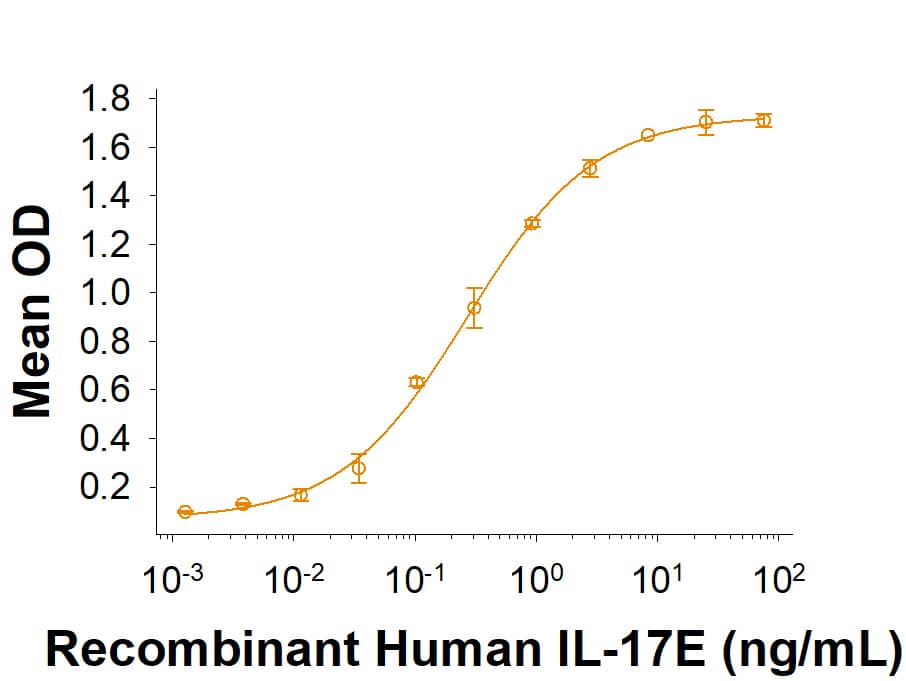Recombinant Human IL-17E Protein
R&D Systems, part of Bio-Techne | Catalog # 1258-IL

Key Product Details
Source
Accession #
Structure / Form
Conjugate
Applications
Product Specifications
Source
Tyr33-Gly177, with an N-terminal Met
Purity
Endotoxin Level
N-terminal Sequence Analysis
Predicted Molecular Mass
Activity
The ED50 for this effect is 0.25-1.5 ng/mL.
Reviewed Applications
Read 2 reviews rated 5 using 1258-IL in the following applications:
Scientific Data Images for Recombinant Human IL-17E Protein
Recombinant Human IL-17E Protein Bioactivity
Measured by its ability to induce CXCL1/GRO alpha secretion in HT‑29 human colon adenocarcinoma cells. The ED50 for this effect is 0.25-1.5 ng/mL.Formulation, Preparation and Storage
Carrier Free
What does CF mean?CF stands for Carrier Free (CF). We typically add Bovine Serum Albumin (BSA) as a carrier protein to our recombinant proteins. Adding a carrier protein enhances protein stability, increases shelf-life, and allows the recombinant protein to be stored at a more dilute concentration. The carrier free version does not contain BSA.
What formulation is right for me?In general, we advise purchasing the recombinant protein with BSA for use in cell or tissue culture, or as an ELISA standard. In contrast, the carrier free protein is recommended for applications, in which the presence of BSA could interfere.
Carrier: 1258-IL
| Formulation | Lyophilized from a 0.2 μm filtered solution in Acetonitrile and TFA with BSA as a carrier protein. |
| Reconstitution | Reconstitute at 100 μg/mL in sterile 4 mM HCl containing at least 0.1% human or bovine serum albumin. |
| Shipping | The product is shipped at ambient temperature. Upon receipt, store it immediately at the temperature recommended below. |
| Stability & Storage | Use a manual defrost freezer and avoid repeated freeze-thaw cycles.
|
Carrier Free: 1258-IL/CF
| Formulation | Lyophilized from a 0.2 μm filtered solution in Acetonitrile and TFA. |
| Reconstitution | Reconstitute at 100 μg/mL in sterile 4 mM HCl. |
| Shipping | The product is shipped at ambient temperature. Upon receipt, store it immediately at the temperature recommended below. |
| Stability & Storage | Use a manual defrost freezer and avoid repeated freeze-thaw cycles.
|
Background: IL-17E/IL-25
References
- Saadoun, D. et al. (2011) Curr. Pharm. Des. 17:3781.
- Iwakura, Y. et al. (2011) Immunity 34:149.
- Lee, J. et al. (2001) J. Biol. Chem. 276:1660.
- Fort, M.M. et al. (2001) Immunity 15:985.
- Zhao, A. et al. (2010) J. Immunol. 185:6921.
- Suzukawa, M. et al. (2012) J. Immunol. 189:3641.
- Corrigan, C.J. et al. (2011) Proc. Natl. Acad. Sci. USA 108:1579.
- Petersen, B.C. et al. (2012) Nat. Med. 18:751.
- Wang, Y.-H. et al. (2007) J. Exp. Med. 204:1837.
- Rickel, E.A. et al. (2008) J. Immunol. 181:4299.
- Hurst, S.D. et al. (2002) J. Immunol. 169:443.
- Kleinschek, M.A. et al. (2007) J. Exp. Med. 204:161.
- Cao, Q. et al. (2011) J. Am. Soc. Nephrol. 22:1229.
- Stock, P. et al. (2009) J. Immunol. 182:5116.
- Caruso, R. et al. (2009) Gastroenterology 136:2270.
- Goswami, S. et al. (2009) Nat. Immunol. 10:496.
- Sonobe, Y. et al. (2009) J. Biol. Chem. 284:31834.
Long Name
Alternate Names
Gene Symbol
UniProt
Additional IL-17E/IL-25 Products
Product Documents for Recombinant Human IL-17E Protein
Product Specific Notices for Recombinant Human IL-17E Protein
For research use only
